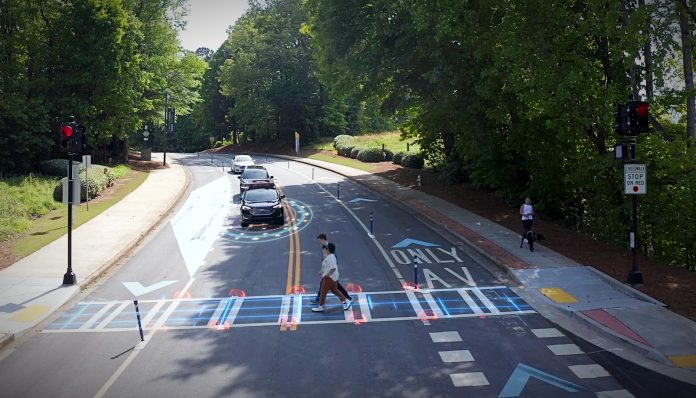Qualcomm is working with Dallas-based professional services and consulting firm Jacobs to deploy and test 5G-based cellular vehicle-to-everything (C-V2X) technology in the Atlanta suburb of Peachtree Corners, in Georgia in the US. The new work is geared around roadside infrastructure, traffic management, and road safety.
The city of Peachtree Corners, home to the Curiosity Lab smart city project, funded by the city and federal grants, has also engaged US V2X solution provider Commsignia to provide the roadside units for the project; these will be equipped with Qualcomm’s C-V2X solution to demonstrate direct vehicle-to-infrastructure (V2I) communications.
Qualcomm is positioned as ‘ecosystem enabler’ in the project; the work is being run through its smart cities accelerator initiative. Jacobs is managing the installation and project delivery. A statement said the project aims to demonstrate the “continued momentum of smart cities” and establish a “model for other municipalities”.
The C-V2X system uses 5G in the global 5.9 GHz ITS spectrum, without the need for a cellular operator or subscription. It integrates with camera, radar, and LIDAR (light detection and radar) based driver assistance systems (ADAS) sensors. The direct 5G linkage offers a low latency network for vehicles to broadcast to other vehicles, roadside infrastructure and, with further optimizations, to pedestrians and other road users.
The deployment at Peachtree Corners, as part of the Curiosity Lab project, affords a live testbed for the technology, with connected vehicles and infrastructure interacting with “real-world” pedestrians and road crossings. Curiosity Lab includes a 1.5-mile test and demo track for autonomous vehicles and a glut of smart city pilots on a 500-acre technology park.
Sanjeet Pandit, senior director of business development and global head of smart cities at Qualcomm Technologies, said: “This not only highlights the ability to implement digital road infrastructure to optimize traffic and enable safer streets across global cities, but our continued commitment to offer advanced solutions for traffic safety. This project is paving the way as an example of what communities can replicate and I expect these advanced end-to-end solutions to be an integral part of future smart city and smart connected spaces rollouts.”
Tom Meinhart, senior vice president and regional director of ‘people and places’ solutions at Jacobs, said: “In addition to procuring, installing and testing the IoT infrastructure, we’re bringing planning expertise to help Peachtree Corners realize its smart city vision. From procurement to closeout, Jacobs and our partners work to improve safety and connectivity, while enhancing digital infrastructure and smart capabilities in the city.”
Brandon Branham, assistant city manager and chief technology officer at Peachtree Corners, said: “We’ve always stressed the importance of smart connected infrastructure to support all parts of an ecosystem – from autonomous vehicles and shuttles deployed for residents, pedestrians crossing the road, smart traffic management, public safety to other areas of everyday life.”

